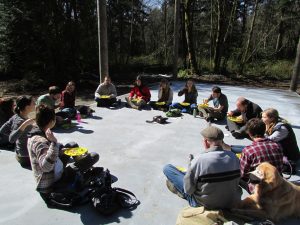In this second post on Reimagining Everyday Spirituality I want to talk about our need to be attentive to others. Pretty logical you might think, after all the scriptures remind us to:
get beyond yourself and protecting your own interests; be sincere and secure your neighbour’s interests first. (Phil 2:4 The Voice).
But how easy is that? Most of us don’t converse with people we talk to them, more interested in getting our own point across than in hearing what they have to say. We are easily distracted by text messages, phone calls and social media. Even when the person we are conversing with starts to speak our minds are focused on what we want to say next. Consciously or even unconsciously we seek to control others by telling them what to do and how to do it.
I became aware of that at the beginning of Lent. I had a very clear agenda for how our MSA team should practice Lent and I wanted everyone else to buy into it. Fortunately our use of the Quaker discernment process in our team meetings has taught me to listen. And that listening resulted in a whole different approach to Lent – from a season of denial to one of transformation.
Our involvement in our communities is often done with little listening too. We think we know what the community needs.How often do we miss what God is saying and wanting to do in our lives and in those of others because we do not listen carefully? or because we fail to ask the right questions.
I learned this lesson from a Yale Masters in Public Health class that went door to door in their neighbourhood asking: What is the best thing we could do to improve your health? The answer from the community was something that was not even on their screens – Teach us to vote. If we can vote, we can elect officials that have our interests at heart, then we will get the health clinics and the garbage collections that we need.
A friend of mine who does ministry into Mexico learnt the same lesson when they asked their target community What would you like us to build first? The unexpected answer was a basketball court. The community felt that this would provide a neutral gathering place and environment that would bring together warring factions within the community. And it worked. A community centre, school and health clinic then grew up around the playing field.
What does this have to do with spiritual practice you may ask? Well in my mind learning to listen is one of the most important spiritual practices we can develop. Giving others our full attention as they speak means that we value them as persons who are fully human. Being receptive to what they have to teach us opens us to new perspectives that enrich our lives and our faith.
And through our listening we often meet Jesus who does come to us in the homeless, the marginalized and the disadvantaged. Such listening makes us aware of injustices we never thought about before – lack of a living wage, abuse in families, atrocities of sex trafficking, ongoing racism and discrimination are still hidden in our communities. We can turn a blind eye and pretend they don;t exist or we can break out of our comfortable Sunday go to church approach to spirituality and listen with the willingness to respond.

